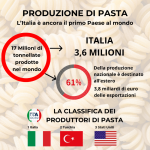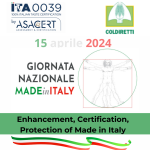Just as measures are being developed in Italy to strengthen the Made in Italy brand and fight against Italian Sounding (see Growth Decree) in the United States, President Trump announces an increase in duties, Coldiretti launches SOS FAKE.
The US company Boeing faces a serious corporate crisis following the incidents caused by its “defective” Boeing 737 Max, while the rival company Airbus receives aid from the European Union, subsidies that according to the World Trade Organization would have a negative impact on the US economy .
Facts that, apparently, have little to do with the export of Italian food abroad, instead President Trump decides to balance the accounts with an increase in customs tariffs on products from the EU.
This is the situation that has emerged in recent days.
At risk products for a total value of 11 million dollars, including many Made in Italy products and the most affected, taken for granted to say it, is the agri-food sector.
Cheese, oil, citrus fruits and above all wine, the value of agri-food exports to the United States is 4.2 billion and represents about 10% of total national exports1.
According to Coldiretti the increase in tariffs would lead to an increase in the price of blacklisted products and this would lead to an intensification of the phenomenon of Italian Sounding, that is the production of drinks and foodstuffs passed off as Italian but which have only the name of Italian, and often not even that (just think of Crisecco, an imitation of Prosecco, and Fontiago, a curious fusion of the two renowned Fontina and Asiago cheeses).
We recall that ASACERT, just to combat the spread of this phenomenon and promote the Italian authenticity of products, recipes and restaurants, has launched the ITA0039 | 100% Italian Taste protocol, on the basis of which certifies Italian restaurants abroad after an accurate verification of all established criteria, including the origin of the raw materials.
An increase in the prices of authentic Italian products and the consequent increase in fakes would put Italian producers in serious difficulty and inhibit the already sufficiently blurred ability to distinguish of false from true, imitation from authentic. In a similar context, a certification issued by an Italian accredited and internationally recognized body becomes a requirement, as well as a guarantee.
1 Coldiretti analysis on Istat data
© Reserved Production






